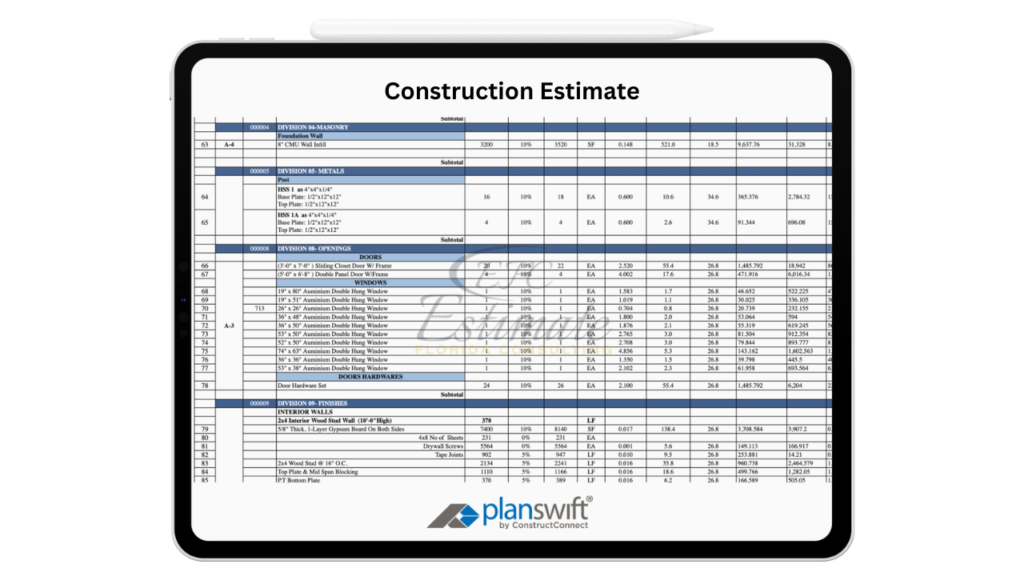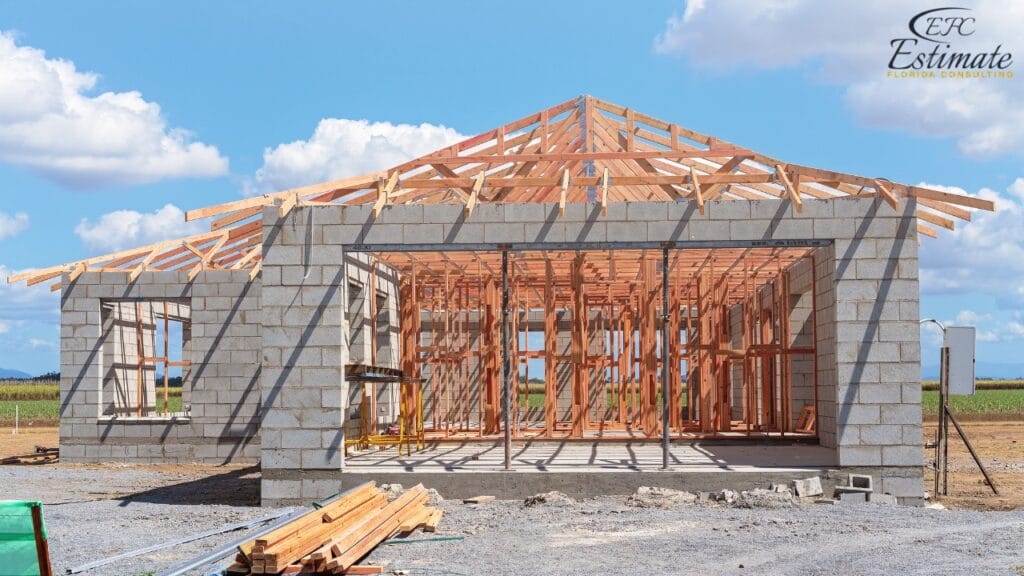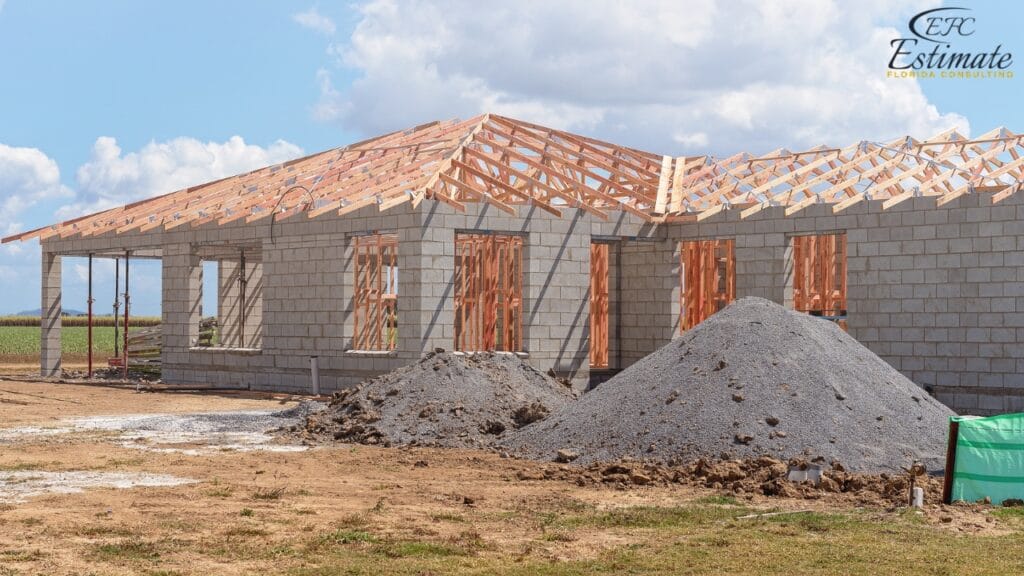90% More Chances to Win Projects With Our Estimate!
- Multi-Family Building
- Hotel Building
- Hospital Building
- Warehouse Building
- School & University Building
- High-Rise Building
- Shopping Complex
- Data Center Building

Leading provider of rsidential projects estimating.
Estimating costs for residential projects is a critical task for homeowners, contractors, and developers alike. Accurate cost estimation not only ensures that a project stays within budget but also helps in making informed decisions throughout the construction or renovation process. Understanding the various elements that contribute to costs allows stakeholders to allocate resources effectively, minimize waste, and maximize the return on investment.

Constructing a new home involves various costs, including materials, labor, permits, and design fees. These costs can vary widely based on location, materials chosen, and the complexity of the design. On average, the cost of building a new home in Florida typically ranges from $150 to $400 per square foot, depending on the quality of materials and finishes used. Below is a detailed breakdown of the costs associated with different home sizes:
Home Size (sq ft) | Low-End Cost | High-End Cost | Average Cost |
1,500 | $292,500 | $780,000 | $536,250 |
2,000 | $400,000 | $1,040,000 | $720,000 |
2,500 | $487,500 | $1,300,000 | $893,750 |
3,000 | $600,000 | $1,560,000 | $1,080,000 |
Each of these figures includes essential elements such as site preparation, foundation work, and finishing costs. Additional costs may arise from landscaping, fencing, and outdoor amenities, which should also be factored into the overall budget. Finishing costs can include interior design elements like paint, flooring, and fixtures, which can dramatically influence the final price tag.
Renovating an existing home can significantly increase its value and improve functionality. Home renovations can cover a wide range of projects, from minor updates to major overhauls. Here are some common renovation projects and their estimated costs:
A kitchen renovation can be one of the most impactful improvements to a home, as it is often considered the heart of the home. Average costs for a mid-range kitchen remodel typically range from $19,500 to $65,000. Factors influencing costs include the quality of appliances, cabinetry, countertops, and flooring selected. Here’s a closer look:
Renovation Type | Low-End Cost | High-End Cost | Average Cost |
Minor Update | $19,500 | $32,500 | $26,000 |
Major Renovation | $38,000 | $65,000 | $51,500 |
For a minor update, costs may include new cabinet doors, hardware, and a fresh coat of paint. A major renovation might involve complete cabinetry replacement, new countertops, upgraded appliances, and improved lighting. Additionally, plumbing and electrical upgrades may also be necessary, further impacting the overall renovation costs.
Bathroom renovations can also add significant value and comfort. The average cost for a bathroom remodel typically ranges from $6,500 to $39,000, depending on the extent of the remodel and the quality of finishes selected.
Renovation Type | Low-End Cost | High-End Cost | Average Cost |
Minor Update | $6,500 | $13,000 | $9,750 |
Major Renovation | $19,500 | $39,000 | $29,250 |
A minor update might involve replacing fixtures and repainting, while a major renovation could include a complete redesign with a new layout, custom tile work, and modern plumbing fixtures. Homeowners should also consider the addition of luxury features such as heated flooring, smart mirrors, and high-efficiency toilets that can enhance the bathroom experience.
Updating living spaces, such as the living room, can create a more inviting atmosphere and improve the overall aesthetic of the home. Costs for living room renovations can range from $4,000 to $26,000 depending on the changes made, such as flooring, paint, and built-ins.
Renovation Type | Low-End Cost | High-End Cost | Average Cost |
Minor Update | $4,000 | $10,000 | $7,000 |
Major Renovation | $15,000 | $26,000 | $20,500 |
Minor updates may focus on cosmetic improvements like painting and new furnishings, whereas major renovations might involve structural changes like removing walls or adding built-in shelving. Considerations for lighting design and creating an open floor plan can also elevate the overall feel of the living space, potentially increasing the home’s value.
Exterior renovations enhance curb appeal and functionality, making a home more inviting. Here are some common projects and their estimated costs:
Adding a deck can provide outdoor space for relaxation and entertainment, significantly enhancing the living space. Costs for deck installation can range from $19.50 to $45.50 per square foot, depending on materials used and complexity of the design.
Deck Size (sq ft) | Low-End Cost | High-End Cost | Average Cost |
200 | $3,900 | $9,100 | $6,500 |
400 | $7,800 | $18,200 | $13,000 |
A smaller deck made from treated wood will be less expensive than a larger, more elaborate deck constructed from composite materials with built-in seating and lighting. Considerations for railings, stairs, and integrated lighting can further influence the overall cost of the project.
Roofing projects vary widely in cost based on materials used and home size. A complete roof replacement can typically range from $6,500 to $19,500.
Home Size (sq ft) | Low-End Cost | High-End Cost | Average Cost |
1,500 | $6,500 | $13,000 | $9,750 |
2,000 | $7,800 | $15,600 | $11,700 |
Aspects such as roof pitch, material type (asphalt shingles, tile, metal), and any additional structural work will influence overall costs. Upgrading to energy-efficient roofing materials can lead to lower energy bills, making it a wise investment over time.
Installing or upgrading HVAC systems is critical for maintaining comfort and energy efficiency in a home. Average costs for HVAC installation can range from $5,200 to $15,600, depending on the system type, size, and energy efficiency ratings.
System Type | Low-End Cost | High-End Cost | Average Cost |
Central Air System | $5,200 | $9,750 | $7,485 |
Ductless Mini-Split | $7,800 | $15,600 | $11,700 |
Investing in an energy-efficient system can lead to substantial savings on energy bills over time, making it a wise choice for many homeowners. Additionally, modern systems offer features like smart thermostats and variable-speed technology that can further enhance comfort and efficiency.
The quality of materials significantly affects construction and renovation costs. While high-quality materials may come with a higher initial cost, they often result in long-term savings due to durability and reduced maintenance needs. Choosing materials wisely can help balance upfront investment and future costs. For example, investing in high-quality roofing materials can extend the lifespan of a roof, reducing the need for frequent replacements.

Labor rates vary widely by region, project complexity, and contractor experience. It’s essential to include labor costs in your estimates, as they can account for 30% to 50% of the total project budget. Skilled labor may be more expensive upfront, but it can prevent costly mistakes and ensure high-quality workmanship.
Geographic location plays a significant role in determining costs. Urban areas often experience higher labor rates and material costs due to demand and competition. Additionally, local building codes and regulations can impact the cost of permits and inspections, further influencing the overall budget.
Larger and more complex projects naturally incur higher costs due to increased materials, labor, and time required to complete them. Homeowners should carefully assess the scope of their projects to ensure realistic estimates and avoid unexpected expenses. It’s also advisable to prioritize essential elements in a project to maintain budgetary constraints.

Accurate cost estimation is crucial for several reasons:
A precise estimate enables homeowners to effectively manage their budgets. It helps in identifying potential expenses and allows for adjustments to be made early in the planning process, avoiding surprises later. Homeowners can allocate funds to various project components, ensuring that essential elements are prioritized over optional upgrades.
Knowing the expected costs in advance enables better planning and scheduling. It reduces the likelihood of delays caused by financial constraints, as funds will be available when needed for various project phases. This foresight also allows for a more streamlined construction process, minimizing disruptions and improving overall efficiency.
A clear understanding of costs helps allocate resources more efficiently. Homeowners can prioritize essential features and upgrades, ensuring that funds are allocated where they will have the most significant impact. By evaluating costs upfront, they can make informed choices about materials and labor, optimizing their investment.
For contractors and developers, an accurate estimate is often necessary to secure financing or approval from investors. A detailed and realistic cost breakdown can demonstrate the project’s viability and potential profitability. Presenting a thorough estimate can help instill confidence in investors, paving the way for successful project funding.

Accurate cost estimation is paramount in residential projects, whether constructing a new home or renovating an existing space. By understanding the various factors influencing costs—such as material quality, labor, location, and project complexity—homeowners, contractors, and developers can make informed decisions that keep projects on budget and on schedule. Effective cost estimation not only minimizes financial surprises but also enhances resource allocation and project planning. Ultimately, investing time in detailed estimates leads to successful residential projects, ensuring long-term satisfaction and increased property value.
A Residential Projects Cost Estimator is a tool or service that provides detailed cost estimates for various residential construction and renovation projects. It helps homeowners, contractors, and developers understand the potential expenses associated with building or renovating a home, allowing for better financial planning and resource allocation.
Accurate cost estimation is crucial because it helps manage budgets effectively, reduces the likelihood of unexpected expenses, and ensures that funds are available for each project phase. It also aids in project planning, resource allocation, and obtaining financial approvals from investors or lenders.
Several factors influence new home construction costs, including:
To estimate the cost of a home renovation project, consider:
Yes, outdoor improvements can vary widely in cost. For example:
Generally, larger homes have higher construction costs due to increased material and labor requirements. The size directly impacts expenses for everything from site preparation to finishing touches. For instance, building a 2,500 sq ft home may range from $487,500 to $1,300,000, while a 3,000 sq ft home might cost between $600,000 and $1,560,000.
When budgeting for a new home, include:
Yes, you can reduce costs by:
At Estimate Florida Consulting, we offer detailed cost estimates across all major trades, ensuring no part of your project is overlooked. From the foundation to the finishing touches, our trade-specific estimates provide you with a complete and accurate breakdown of costs for any type of construction project.

We take pride in delivering accurate, timely, and reliable estimates that help contractors and builders win more projects. Our clients consistently praise our attention to detail, fast turnaround times, and the positive impact our estimates have on their businesses.
Estimate Florida Consulting has helped us win more bids with their fast and accurate estimates. We trust them for every project!

Submit your project plans, blueprints, or relevant documents through our online form or via email.
We’ll review your project details and send you a quote based on your scope and requirements.
Confirm the details and finalize any adjustments to ensure the estimate meets your project needs.
Receive your detailed, trade-specific estimate within 1-2 business days, ready for your project execution.

561-530-2845
info@estimatorflorida.com
Address
5245 Wiles Rd Apt 3-102 St. Pete Beach, FL 33073 United States
561-530-2845
info@estimatorflorida.com
Address
5245 Wiles Rd Apt 3-102 St. Pete Beach, FL 33073 United States
All copyright © Reserved | Designed By V Marketing Media | Disclaimer